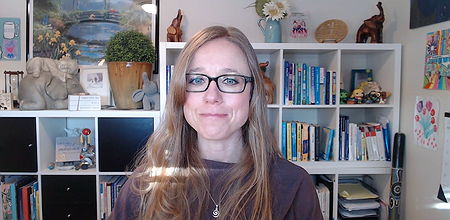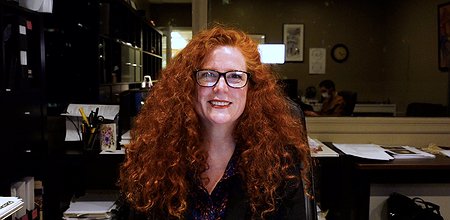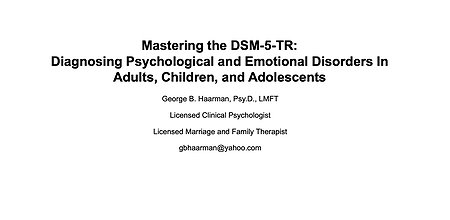- Identify pros and cons of diagnostic models of learning disabilities (LDs), including age discrepancy, IQ discrepancy, patterns of strengths and weaknesses, and response to intervention
- Describe the challenges of applying categorical diagnosis to a continuum of academic skill and the implications for cases falling around the cut-off
- Discuss the ethical and scientific problems with the historical emphasis on “specific” learning disabilities and provide guidance on diagnosis and treatment planning for children with broad-based learning difficulties
Learning Disabilities: Comprehensive Diagnosis & Treatment Planning
Dr. Robin Peterson, Neuropsychologist
From Science to Clinical practice: Navigating the Landscape of Learning Disabilities
Excerpt:
- 4h of continuing education
- 22 lessons that last from 5 to 15 minutes each
- 1 certificate of achievement
- 1 PowerPoint
- 1 bibliography
- 1 course evaluation
- 7-day money back guarantee
- Unlimited access
- 97% of participants who completed the satisfaction survey declare they would recommend this course to a colleague
Overview
Dive deep into the world of learning disabilities (LDs) with Dr. Peterson! Diagnosing and treating children with LDs can be complex. To address these challenges successfully, Dr. Peterson’s workshop offers an overview of the current scientific understanding of LDs. This includes particularly how LDs impact reading, writing, and mathematics, as well as their potential causes related to etiology, brain bases, neuropsychology, and cross-cultural manifestations.
Dr. Peterson will review the evidence on various diagnostic models, such as age and IQ discrepancies, patterns of strengths/weaknesses and response to intervention. She will discuss common comorbidities of LDs and describe how a multiple cognitive deficit model clarifies co-occurring neurodevelopmental disorders. But that’s not all ! She will also share her own research at the Colorado Learning Disabilities Research Center. Then, the session will bridge this rich scientific background to real-world applications, spanning from diagnosis to treatment.
This training will delve into:
- What is a learning disability ?
- A clarification of terminology, including dyslexia, specific reading comprehension disability, dyscalculia, dysgraphia, complex writing problems
- The deficits in dyslexia, reading comprehension, written expression and math disabilities
- Contextual factors in learning disabilities
- The diagnostic model and evidence-based assessments for LDs
- A critique of influential medical definitions from DSM-5 and ICD-11
- How to apply the HOT approach to LD assessment, considering history, observations, and test results
- Treatment planning for learning difficulties in reading, writing, and math
- How to share results with families, schools, and referring providers
Case examples will also give concrete guidance on diagnostic decision making for children with academic learning challenges, while considering common diagnostic quandaries in LD assessment related to severity and specificity.
About the expert

Robin L. Peterson is a pediatric neuropsychologist at Children’s Hospital Colorado and an Associate Professor in the Department of Physical Medicine and Rehabilitation at the University of Colorado School of Medicine. Before becoming a psychologist, she taught kindergarten and first grade, which sparked her interest in understanding how all children learn to read. She earned her PhD in child clinical psychology from the University of Denver in 2010, and completed a postdoctoral fellowship in pediatric neuropsychology at the University of Denver and Children’s Hospital Colorado in 2012.
Her clinical and research interests led her to specialize in neurodevelopmental disorders and acquired brain injuries. As a pediatric neuropsychologist, she provides neuropsychological evaluations to children and adolescents in order to help understand brain-based learning or developmental challenges. She also works with families to develop a treatment plan that will capitalize on the child's strengths and support the child in areas of weakness to promote an optimal developmental trajectory.
She is an author on over 30 peer-reviewed publications, multiple book chapters, and the book Diagnosing Learning Disorders: From Science to Practice (3rd Edition) from Guilford Press. She has received several awards and honors for her publications and work. She remains actively engaged in teaching and supervising graduate students and fellows.
Learning objectives
Learning material
A theoretical course illustrated with clinical examples. This course is composed of videos of 5 to 15 minutes each. The PowerPoint of the course to download.
Syllabus
- PowerPoint
-
Understanding Learning Disabilities: Fundamentals and Perspectives
- 1. Presentation
- 2. What is a learning disability
- 3. View of academic skills
- 4. Terminology
- 5. Etiology
- 6. Brain bases
- 7. Neuropsychology
- 8. Epidemiology
-
Assessment Approaches and Influential Definitions
- 9. Age versus IQ discrepancy
- 10. Response to intervention
- 11. Critical evaluation of influential medical definitions
- 12. Influential legal definition in the U.S.A
- 13. To diagnose or not to diagnose
-
Comprehensive Assessment
- 14. The HOT Approach to assessment - History
- 15. The HOT Approach to assessment - Observations
- 16. The HOT Approach to assessment - Test results
- 17. Treatment planning
-
Communication of Results
- 18. Reliable assessment of complex academic skills
- 19. Concerns about severity
- 20. Specificity
- 21. Sharing your results
- 22. Conclusion
- Bibliography
CE Credits
Download a certificate of successful completion.
Audience
This training is intended for mental health professionals.
Your comments
"Excellent delivery. Nice to have the accompanying slides to print out.
Her case examples and written summaries at the end were very helpful and tied it all together." (automatically translated)
A psychologist
"Overall great course, and a very good use of CE time!"
A psychologist (United States)
"A great course - Thank You!!"
A psychologist (Canada)
"in 15+ years this is the best training i've had"
A psychologist (Canada)
Registration
Ask a question
Do you have a question? Then email us at contact@asadis.net
Frequently asked questions
-
Is there an evaluation at the end of the course?
To validate the achievement of the learning objectives, a final evaluation in the form of true/false questions is required. It must be completed in order to obtain the certificate of completion.
In addition, an optional self-assessment is offered at the beginning and end of the course, allowing you to measure your progress on the targeted skills.
These evaluations are not graded and are intended primarily to support your professional reflection.
-
I have a disability. Can I receive specific support?
Yes! This training is offered as a pre-recorded video format, without subtitles. If you have a disability, we can provide an adapted alternative (technical assistance for viewing or individual supervision). For any request, please contact our disability coordinator at the following address: contact@asadis.net
-
How long do I have access to the course?
After your registration, the course is accessible anytime and from anywhere with unlimited access.
-
When does the course start?
That is entirely up to you! When you buy a course, you'll receive an access link that you can activate when you want.
-
Is there a student rate?
Yes there is! To learn more, email us at contact@asadis.net.
Legal notice
The courses offered by ASADIS are accredited by different professional organisations. In addition, ASADIS is approved by the Canadian Psychological Association to offer continuing education for psychologists. ASADIS maintains responsibility for the program.
The CPA’s approval of an individual, group, or organization as a CE Sponsor or Provider is restricted to the activities described in the approved application or annual report form. The CPA’s approval does not extend to any other CE activity the Sponsor or Provider might offer. In granting its approval, the CPA assumes no legal or financial obligations to Sponsors, Providers, or to those individuals who might participate in a Sponsor or Provider’s CE activities or programs. Further, responsibility for the content, provision, and delivery of any CE activity approved by the CPA remains that of the CE Sponsor or Provider. The CPA disclaims all legal liability associated with the content, provision, and delivery of the approved CE activity.




